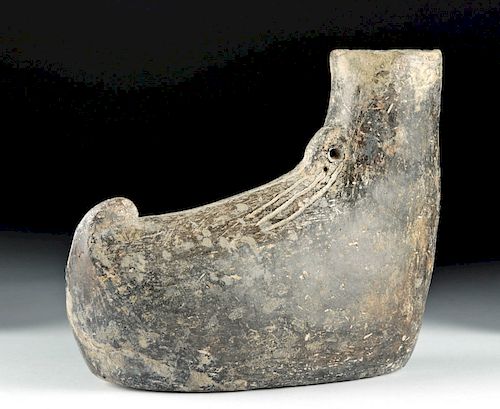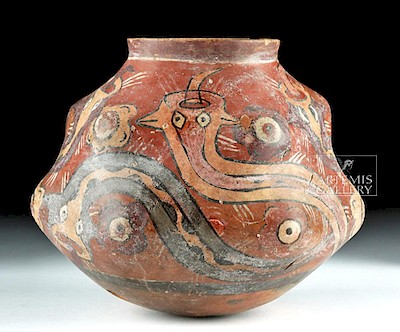Rare Yortan Blackware Shoe-Shaped Vessel w/ TL
Lot 97a
About Seller
Artemis Gallery
686 S Taylor Ave, Ste 106
Louisville, CO 80027
United States
Selling antiquities, ancient and ethnographic art online since 1993, Artemis Gallery specializes in Classical Antiquities (Egyptian, Greek, Roman, Near Eastern), Asian, Pre-Columbian, African / Tribal / Oceanographic art. Our extensive inventory includes pottery, stone, metal, wood, glass and textil...Read more
Estimate:
$1,200 - $1,500
Absentee vs Live bid
Two ways to bid:
- Leave a max absentee bid and the platform will bid on your behalf up to your maximum bid during the live auction.
- Bid live during the auction and your bids will be submitted real-time to the auctioneer.
Bid Increments
| Price | Bid Increment |
|---|---|
| $0 | $25 |
| $300 | $50 |
| $1,000 | $100 |
| $2,000 | $250 |
| $5,000 | $500 |
| $10,000 | $1,000 |
| $20,000 | $2,500 |
| $50,000 | $5,000 |
| $100,000 | $10,000 |
| $200,000 | $20,000 |
About Auction
By Artemis Gallery
Jul 5, 2018
Set Reminder
2018-07-05 10:00:00
2018-07-05 10:00:00
America/New_York
Bidsquare
Bidsquare : Ancient | Ethnographic | Fine Art
https://www.bidsquare.com/auctions/artemis-gallery/ancient-ethnographic-fine-art-3306
Featuring classical antiquities, ancient and ethnographic art from cultures encompassing the globe. Artemis Gallery info@artemisgallery.com
Featuring classical antiquities, ancient and ethnographic art from cultures encompassing the globe. Artemis Gallery info@artemisgallery.com
- Lot Description
Asia Minor, Yortan culture or related in Western Anatolia, Early Bronze Age, ca. 2700 to 2300 BCE. A fine hand-built ceramic vessel with a planar base, an ovoid body with a central ridge on top, a nubbin-shaped projection along one side of the neck, and a wide circular spout. A small perforated suspension loop is situated just below the mouth of the vessel from which a trio of incised striations extending downwards on either side of the body and a singular stripe running the length of the ridge. A small curved "toe" on the end of the shoe-form body may have acted as a gripping point so the vessel could be inverted to pour the liquids contained within. Size: 8.625" L x 7.25" H (21.9 cm x 18.4 cm).
Ancient Western Anatolia is famous for a number of large ruins, most notably Troy (Hisarlik), but many mysteries remain. The Yortan culture is known through a burial site in the valley of Bakir Cai that has not been well-studied. Adults and children were buried, crouched, in large terracotta storage containers; around them were placed a great deal of pottery in the form of jugs, jars, and occasionally bowls, much of it blackware just like this piece. An incredibly rare and well-preserved example from a little-known culture!
This piece has been tested using thermoluminescence (TL) and has been found to be ancient and of the period stated. A full report will accompany purchase.
Provenance: private East Coast, USA collection
All items legal to buy/sell under U.S. Statute covering cultural patrimony Code 2600, CHAPTER 14, and are guaranteed to be as described or your money back.
A Certificate of Authenticity will accompany all winning bids.
We ship worldwide and handle all shipping in-house for your convenience.
#135447Several areas of resurfacing along one side of body. Surface wear and abrasions commensurate with age, small nicks and chips across body, base, and spout, with some fading to exterior color, and light roughness across most surfaces. Light earthen deposits throughout. Old inventory sticker on base.Condition
- Shipping Info
-
All shipping is handled in-house for your convenience. Your invoice from Artemis Gallery will include shipping calculation instructions. If in doubt, please inquire BEFORE bidding for estimated shipping costs for individual items.
-
- Buyer's Premium



 EUR
EUR CAD
CAD AUD
AUD GBP
GBP MXN
MXN HKD
HKD CNY
CNY MYR
MYR SEK
SEK SGD
SGD CHF
CHF THB
THB
















